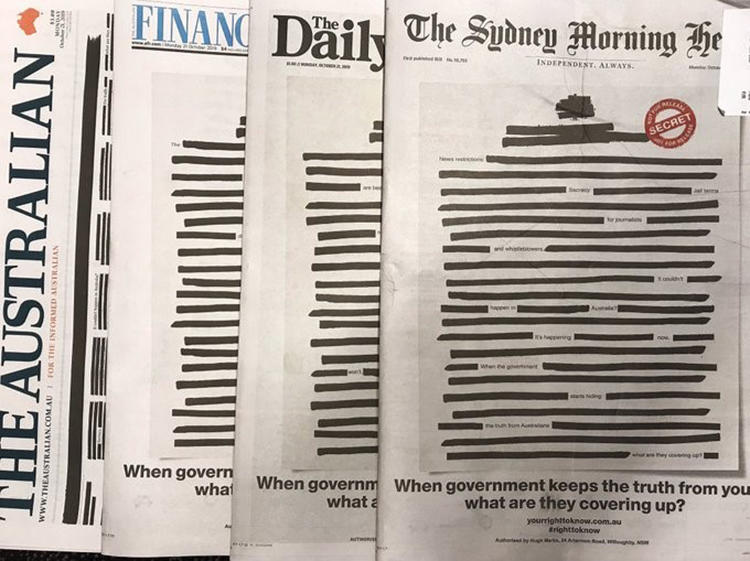In Australia, around two dozen newspapers blacked out their front pages on Monday to fight back against secrecy laws. The campaign, led by Australia’s Right to Know Coalition, follows the June raids on the ABC’s Sydney headquarters and the home of Annika Smethurst, a politics editor for the Sunday Telegraph, the legality of which is being challenged in the high court. CPJ reported on problematic legislation and produced a one-minute video explainer about the concerning raids in June. CPJ stands in solidarity with Australia’s journalistic community and echoes the call for greater transparency and legislative changes to ensure journalists are able to do their job.
CPJ’s Senior Africa Researcher Jonathan Rozen spoke with journalists in Nigeria, where he investigated a global trend of law enforcement seizing journalists’ electronic devices and conducting forensic device searches. CPJ has documented device seizures around the world, from the U.S. to Slovakia and Iraq.
Global press freedom updates
- Legal threats prompt journalists to take creative approaches to investigative stories
- Burundi police arrest Iwacu journalists covering unrest
- Algeria arrests fifth journalist amid anti-government protests
- In Spain, journalists covering Catalonia demonstrations attacked and harassed by police and protesters
- Donetsk militants announce 15-year ‘sentence’ for Ukrainian journalist Stanyslav Aseyev
- Kazakh journalist Amangeldy Batyrbekov jailed on criminal libel charges
- Azerbaijani journalist Seymur Hazi detained in run-up to protests
- U.S. court dismisses suit against former Sri Lankan defense secretary over murder of Sri Lankan journalist Lasantha Wickramatunga
- Russian police raid news outlets and journalists’ homes in October 15 crackdown
- Demonstrators set fire to El Mercurio de Valparaíso newspaper office in Chile
Spotlight
On October 29, 2019, CPJ will publish its annual list of countries where journalists are murdered regularly and their killers go free. The report, “Getting Away with Murder: CPJ’s 2019 Global Impunity Index,” marks the International Day to End Impunity for Crimes against Journalists on November 2.
This year alone, CPJ has confirmed 10 cases of journalists murdered in connection to their work. Explore these cases and more in our database.
Journalists interested in an embargoed copy can email press@cpj.org. Learn more about our ongoing global campaign against impunity here.
What we are reading
- We defend press freedom around the world. Trump is making our job harder. — Joel Simon, The Washington Post
- What if Scale Breaks Community? Rebooting Audience Engagement When Journalism is Under Fire — Julie Posetti, Felix M. Simon and Nabeelah Shabbir, Reuters Institute for the Study of Journalism
- Understanding Information Disorder — Claire Wardle, First Draft
- Tracking journalist stoppages at the US border — Kirstin McCudden, Columbia Journalism Review
- Concrete action rather than nice words are needed on press freedom — Lenore Taylor, The Guardian
- When Espionage Skills Are for Sale, So Is Your Security — Scott Stewart, Stratfor
- The Washington Post’s New Columnist Consults for Spyware Firm That Helps Saudi Arabia Surveil Journalists — Jason Koebler, VICE
